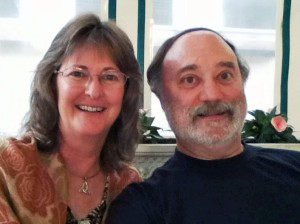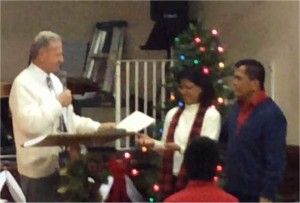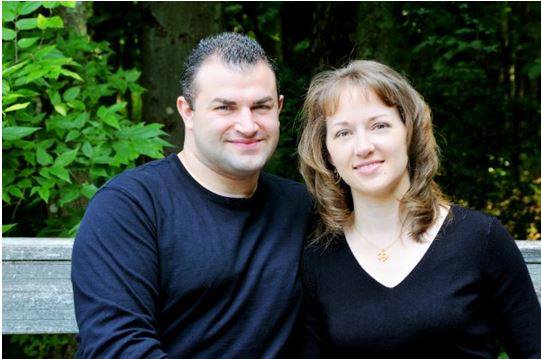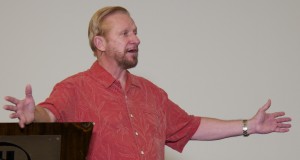Dear Brothers and Sisters in Christ,
 In explaining Trinitarian incarnational theology, we’ve spoken and written a lot about faith, describing it as personal participation in what God has called us to do—this is active faith. But we’ve also described faith as participation, by the Spirit, in Jesus’ own faith—this is passive faith. If addressing faith in both of these ways has caused confusion, I apologize. The truth is that it’s not either/or—it’s both/and. Christian faith is both active and passive. Let me explain.
In explaining Trinitarian incarnational theology, we’ve spoken and written a lot about faith, describing it as personal participation in what God has called us to do—this is active faith. But we’ve also described faith as participation, by the Spirit, in Jesus’ own faith—this is passive faith. If addressing faith in both of these ways has caused confusion, I apologize. The truth is that it’s not either/or—it’s both/and. Christian faith is both active and passive. Let me explain.
 I hope we remind ourselves every morning to live that day through faith in Christ. Doing so not only motivates us to prepare for the challenges ahead, it reminds us where our faith comes from. Faith and the repentance that accompanies it are gifts of the Spirit. I believe this is what Peter had in mind when he wrote, “Prepare your minds for action” (1 Peter 1:13 NASB). The early church must have had this in mind as they grew over a period of 300 years from 120 believers to dominating the Roman Empire. This reminder to live by the Spirit through faith in Christ is both active and passive.
I hope we remind ourselves every morning to live that day through faith in Christ. Doing so not only motivates us to prepare for the challenges ahead, it reminds us where our faith comes from. Faith and the repentance that accompanies it are gifts of the Spirit. I believe this is what Peter had in mind when he wrote, “Prepare your minds for action” (1 Peter 1:13 NASB). The early church must have had this in mind as they grew over a period of 300 years from 120 believers to dominating the Roman Empire. This reminder to live by the Spirit through faith in Christ is both active and passive.
Seeing our faith as either active or passive leads to an imperfect understanding of the revolutionary nature of Christian discipleship. Christ lives in us (active) but we also live in Christ (passive). As the apostle John makes clear in 1 John 1:8-10, we know no matter how active our faith may be in this life, we will never be totally free from sin and so never perfect. Thus our active faith is never sufficient. But, praise God, this is not the final word. Jesus came and began a new life in us that he will finish (Philippians 1:6)—he will continue to give us the gift of sharing (more and more) in his perfect faith (trust) in the Father by the Spirit.
I believe it is not only more theologically accurate, but also beneficial to our mental health that we recognize faith as both active and passive. Emphasizing one over the other leads to all sorts of problems. If we emphasize active faith, there is the danger of self-righteously viewing others as less faithful and righteous. But if we emphasize passive faith, there is the danger of antinomianism (believing there is no obligation to keep a moral law), libertinism (living without morals and responsibility) and spiritual laziness. Both extremes stem from an incomplete understanding of sanctification (in Christ and by the Spirit) and often results in a joyless Christian life.
Put another way, taking one side or the other is being one-dimensional in a four-dimensional world. Think of the two aspects as two points on a circle, each point leading to the other, and the whole circle in Christ. We better understand faith when we carefully examine the topic of sanctification. The word translated “sanctification” means “set apart” or “separation.” In his high priestly prayer, Jesus said: “For them I sanctify myself, that they too may be truly sanctified” (John 17:19). Jesus set himself apart in order to set us apart. Sanctification speaks to the passive side of faith as reliance on God to make us more like Jesus Christ by uniting us with him. In being united with him we are then drawn by his Word and Spirit into deep and personal relationship with the Triune God. This is the active side of faith—our response to God’s love, our desire to grow in our relationship with God. In that relationship we realize that God is empowering us to pursue and live out holiness, that is, live out our being set aside for communion with the Triune God.
Faith, in both its passive and active elements, rests upon and is under-girded by the faith of Jesus Christ, who lived in and lived out his relationship with the Father in the Spirit. This is what he came to share with us. When we lack assurance in the faith of Christ (his own faith and repentance in our place and on our behalf), we are thrown back upon ourselves to rely upon our own repentance and faith. One thing we should all acknowledge is that we can’t even remember all the sins from which we should repent. For this reason alone, we don’t want to be thrown back upon our own spiritual strength—we want the faithful strength of Jesus to be at work in us.
Note how T.F. Torrance explained Jesus’ faithfulness:
Jesus Christ stood in our place, taking our cause upon him, also as Believer, as the Obedient One who was himself justified before God as his beloved Son in whom he was well pleased. He offered to God . . . a perfect faith and response which we are unable to offer, and he appropriated all God’s blessings which we are unable to appropriate. Through union with him we share in his faith, in his obedience, in his trust and appropriation of the Father’s blessing; we share in his justification before God. Therefore when we are justified by faith, this does not mean that it is our faith that justifies us, far from it—It is the faith of Christ alone that justifies us, but we in faith flee from our own acts even of repentance, confession, trust and response, and take refuge in the obedience and faithfulness of Christ—“Lord I believe, help thou mine unbelief.” That is what it means to be justified by faith. (“Justification: Its Radical Nature and Place in Reformed Doctrine and Life,” Scottish Journal of Theology, vol 13, no 3. pp. 225-246.)
Our sanctification is the work of the Trinity. Jesus said “My Father is always at his work to this very day, and I too am working” (John 5:17). Our heavenly Father always works in us “to will and to act in order to fulfill his good purpose” (Philippians 2:13). God works in us to change our wrong desires. Jesus’ ministry sanctifies us, and his work on the cross became our sanctification (1 Corinthians 1:30 NASB). He is the author and the finisher of our faith. The Holy Spirit is the agent of our sanctification. He produces in us the fruit of sanctification (Galatians 5:22-23).
Perhaps we can see more clearly that we are both passive and active in our being sanctified. Passively, we trust God to sanctify us, for it is his will that we be sanctified. Actively, we choose to do what is good, right and faithful. Here is how Paul put it: “It is God’s will that you should be sanctified: that you should avoid sexual immorality; that each of you should learn to control your own body in a way that is holy and honorable” (1 Thessalonians 4:3-4).
An easy way to show the value of both active and passive faith is in this statement: We praise God and respond (active) to the gift of sanctification that we can receive (passive) through the faith and faithfulness of Jesus through the Holy Spirit.
Living in faith,
Joseph Tkach













